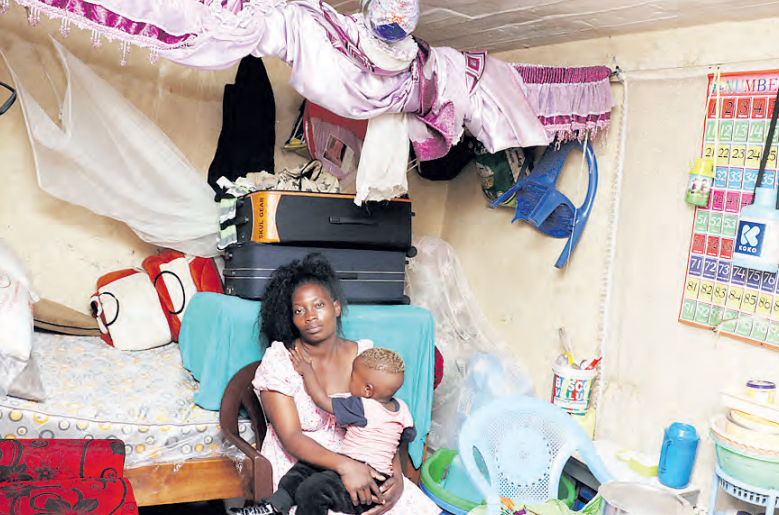
Open sewers flowing uninterrupted welcomes one to Mukuru Kwa
Njenga slums.
Here, its survival for the fittest.
Milka Moraa, 30, knows this too well having left her Kisii
home in 2016, determined to emancipate her family from the chains of poverty.
While at the once green city in the sun, the reality of
joblessness and hopelessness confronted her.
Moraa was forced to take refuge in Mukuru Kwa Njenga slums.
“I was keen to have better life,” she says.
Mukuru slums covers three settlements in an area of 689
acres, with a population of 100,561 households living in difficult conditions.
Ninety-four per cent of Mukuru dwellers are tenants in tiny
iron sheet shacks with minimal infrastructure.
Owing to the difficult conditions that hinder effective
planning and development, Mukuru was declared a Special Planning Area by the
government.
The declaration
allows the unique development challenges in Mukuru to be addressed in a
specialised and participatory manner as required by the Physical and Land Use Planning Act.
At the city, Moraa,
unwilling to throw in the towel decided to engage in casual jobs to put food on
the table for her two children.
As she tried to put
her house in order, life became unbearable and was forced to put up at the
iron-sheet houses, within the slums where her monthly house rent then was
Sh2,000.
“I lived in an iron-sheet house for four years,” she says.
Moraa and her family have lived in deplorable conditions,
struggling with inadequate shelter, lack of basic amenities and insecurity.
With two children aged seven years and the other one a year
and seven months, her only sister later joined her putting further pressure on
her finances.
She has been washing clothes in the neighbourhood to earn a
living and earns between Sh500 and Sh700 per day.
“I have been washing clothes for the last three years,” she
says.
Today, Moraa lives in a single room with her two children
and her sister paying Sh4,000 rent. ‘
The money from washing clothes is however not enough sustain
them.
Already, the landlord was at the verge of closing her house
due to an outstanding rent of Sh8,000. This devastated her and forced her to
try and find a solution from the church.
“I went to Pastor Ng’ang’a during one of the church services
and he outrightly told me that he was not going to help me,” Moraa says.
She says the pastor told her that his place was for prayers
and not offering financial support.
“It was painful and I
felt bad,” Moraa says, adding that she did not even have fare to go back home.
Moraa said the incident at the church left her humiliated,
as the individual she turned to for help dismissed her request, telling her to
instead turn to the government for affordable housing.
While the experience
was painful, it turned out to be a turning point because the government has
taken up the challenge and is now walking with her on a journey that will
change her life forever.
That day, a good Samaritan stepped in and gave her fare back
home. Moraa’s woes would later be shared on social media where help came in
after her video went viral.
Well-wishers would later connect Moraa to the affordable
housing plan being rolled out by the state.
Kenyan police officer Sammy Ondimu led other well-wishers in
ensuring that Moraa’s dreams of owning a house one day was realised.
Following the interventions, Moraa is today on the cusp of a
life-changing opportunity — the chance to own a home in the upcoming Mukuru
Social housing project in Nairobi county.
Moraa has already met with Lands, Housing CS Alice Wahome,
to finalise her registration under the government’s Affordable Housing
Programme through Boma Yangu.
She has already signed an agreement with the state to secure
a bedsitter.
“I have seen the
house and it is in good condition,” says Moraa who will be leaving shortly for
her new home.
In a post on
Facebook, CS Wahome disclosed that Moraa had paid her deposit and will continue
paying as she rents to own.
“This morning, at
Ardhi House, I met Milka Moraa who explained to me her journey to where she is
now, we also discussed her registration to the Affordable Housing Programme
through Boma Yangu,” she said.
“She has paid her deposit and will continue paying as she
rents to own. In two months, Milka is now set to own a self-contained home at Mukuru
site, that is complete with essential amenities, including a kitchen, bathroom
and toilet.”
The CS thanked Ondimu for not only sharing Moraa’s plight
but also supporting her through the documentation process.
The CS also thanked Pastor Ng’ang’a for directing Moraa to affordable housing.









![[PHOTOS] Gachagua warm reception in Nyandarua](/_next/image?url=https%3A%2F%2Fcdn.radioafrica.digital%2Fimage%2F2025%2F04%2Fc2a8c64d-5577-4768-a0ac-513c8876c288.jpeg&w=3840&q=100)


